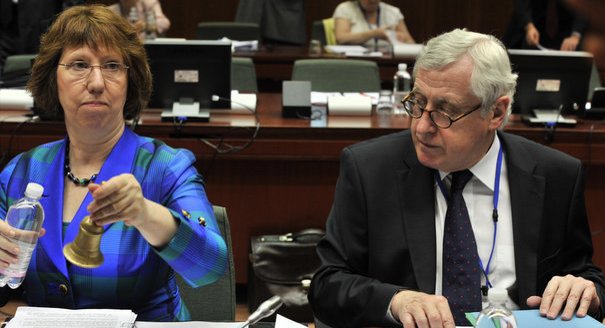The European Union’s top diplomats and officials like to adopt the moral high ground when it comes to human rights and the rule of law.
But there is also the EU’s adulation of soft power. Europe prides itself on its "soft-power" philosophy, never questioning what happens if soft power is not sufficient to influence change or prevent conflicts.
Yet if human rights and soft power are the two quintessential characteristics of the EU, why is it that the 27 member states are so opposed to melding these into a new security strategy? Indeed, why hasn’t the EU come up with a trenchant security strategy instead of tinkering, as it did once before in 2008, with the first-ever strategy that was published back in 2003?
The answer is that the EU lacks the courage because it would mean asking difficult questions about Europe’s place in the world. It would also mean that individual member states, including Germany, would be forced to define their national interests and decide how they correspond to Europe’s strategic interests.
Whenever EU officials are asked about the need for a new security strategy, it is as if they read their answers from the same briefing note.
With few exceptions such as Sweden and Poland, they give explanations, or rather in my view, feeble excuses, for not having a new security strategy.
They say the time is not right because of the euro crisis. That is the number one issue to resolved right now. But whoever said that once this particular crisis is over, you won’t have the next one looming?
Then they say the discussion would open up a hornet’s nest because each of the 27 member states would have their own notion of what Europe’s strategy and security interests should be. It would therefore be impossible to reach consensus. But what’s so bad about hearing what the strategic interests of all the member states are?
Furthermore, the idea of discussing a security strategy could divide the EU, especially when it comes to members dealing with countries such as Russia, Israel, and the United States or issues such as oil or nuclear weapons. As if the EU was not already divided over those issues! I think this would be all the more reason for Europe to discuss its stance.
And then there’s the ridiculous argument that it would be best to wait before thinking about a new security strategy because the European External Action Service—which should be simply called the EU’s diplomatic service—is still trying to get off the ground. I thought the EEAS was about strategy.
All these reasons are intellectually lazy.
Europe needs a security strategy, or doctrine, because the EU has to explain what it stands for, to itself and to the outside world.
It’s what the United States does, it’s what Russia and China do. It is one of the best ways to explain to the world how a power thinks and therefore how it might act.
Saying that the EU stands for human rights and soft power is all very well but it is an inadequate response to current complex issues and crises.
The EU has to spell out clearly what its interests are and whether or not they coincide with its values. Read the American and Russian security strategies. You know where you stand.
Separate regional strategy papers are all very well and worthy. But they do not pull together in an integrated way the bloc’s strategic thinking and goals. Now, more than ever, is the time to do this.
Catherine Ashton, who after all is the EU’s foreign policy chief, needs to kick-start a discussion for a new security strategy with the aim of articulating the bloc’s long-term strategic policies.
Why? For several reasons.
Europe and its neighborhood have changed, almost beyond recognition since 2003 when the EU’s former foreign policy chief Javier Solana published “A Secure Europe in a Better World”—the first EU security strategy document.
The EU now includes many former communist countries that have a special security perspective, especially with regard to Russia and Turkey. This is why enlargement has rightly put some of the focus on the potential instability in the Caucasus.
The EU’s Southern flank, as a result of the Arab Spring, is changing too at a fantastic speed, not to mention the upheavals taking place in the Sahel that could pose very serious threats to Europe. The growing threats of nuclear proliferation are other existential threats facing Europe and indeed the rest of the world.
There are no quick fixes to any of these problems. Nor can the EU deal with them by itself. That is why a security strategy needs to examine what kind of relationship Europe wants with the United States, first of all, but also with China and Russia.
These are all issues that require strategic thinking and strategic goals. Postponing the debate is a big mistake. It shows that Europe has no idea what its strategic interests and goals are. That’s shameful.






